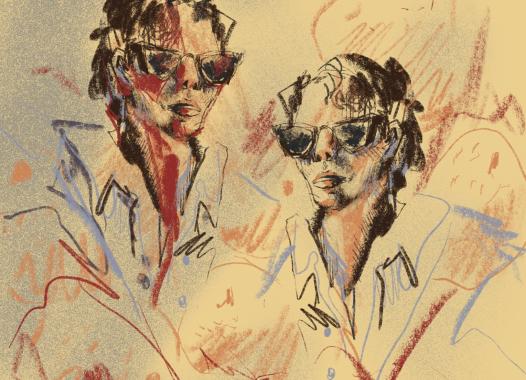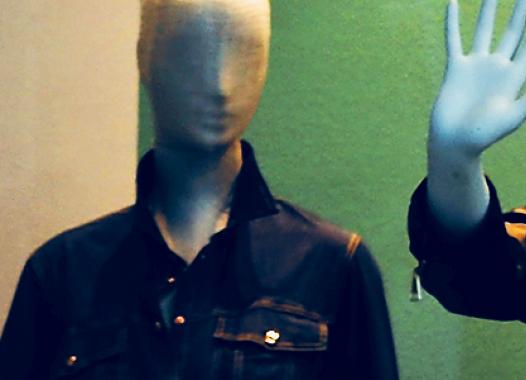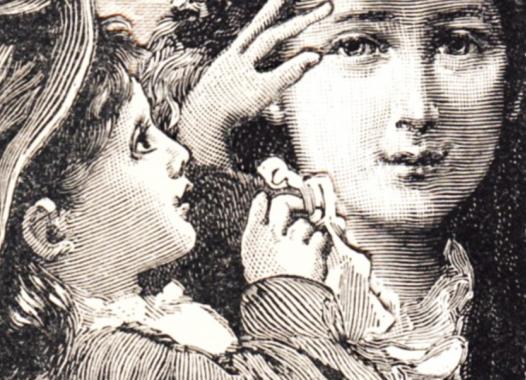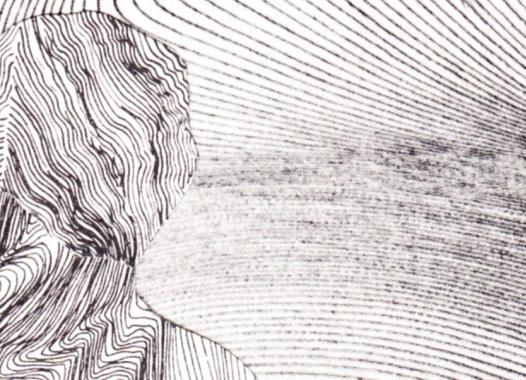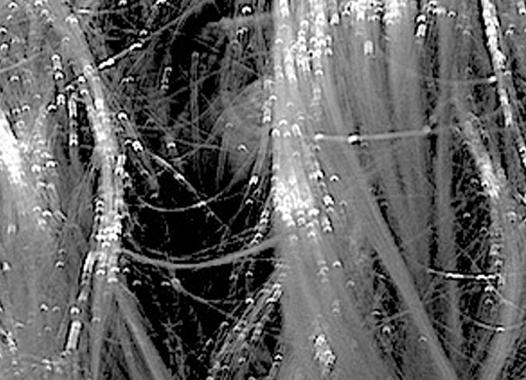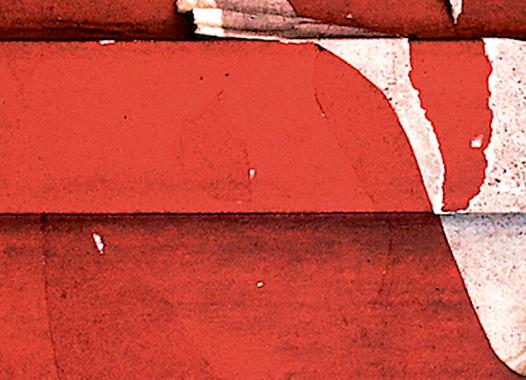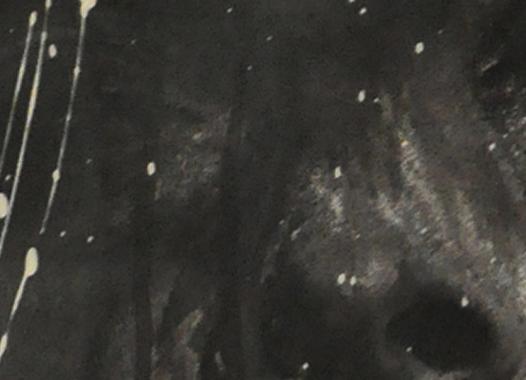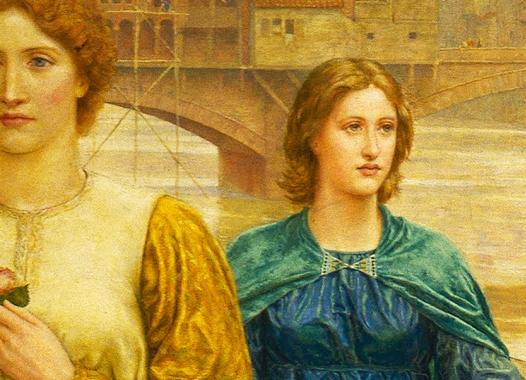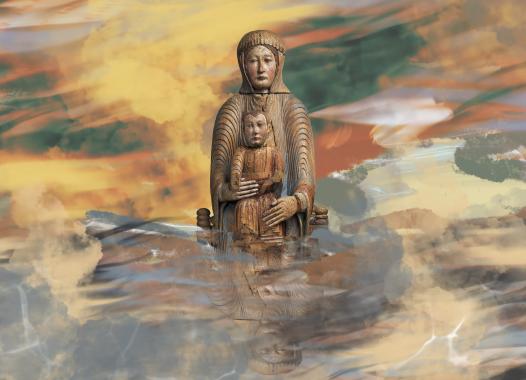
Translated by Nicole Gounalis. The original Italian appeared online at Storie.
Elena Ferrante’s face in the Anglophone world today is that of her translator, Ann Goldstein. New Yorker editor, and guardian of its prestige, on March 30 of this year she returned as an ex-student to Bennington College—she left in 1971—where she met with a small group of students before taking part in an evening at a lecture hall on campus. BARBARA ALFANO, who has taught Italian literature at the Vermont college for years, gathered the testimony of Goldstein’s almost superhuman determination.
DANTE’S COMEDY AND THE NEW YORKER
What demon possessed you, at age 37, to learn Italian in order to read the Divine Comedy in the original and, furthermore, all of it, not just the Inferno, like most students in the United States? Was it the itch to discover this other world within the words of a person who recounted having been there, or were you overtaken by this mania because someone had explained to you that Dante is the father of the Italian language and, as the head copy-editor at the New Yorker, perhaps tired of embellishing others’ stories, eliminating useless adverbs and changing comma placements, you decided to learn a new language from its source?
Because you are also an editor of the magazine, a guardian of its prestige, and you know that certain things are either done well or not at all, and therefore to learn Italian you should start with Dante. Was it like that? That you were taken midway upon the difficult and industrious New Yorker journey?
This is what I wanted to ask Ann Goldstein (b. 1950), as soon as I met her, but we were seated in a classroom in Bennington, Vermont, in front of fifteen students eager to ask her questions about Elena Ferrante and Ferrante’s novels, all of which Ann has translated. She was as shy and surprised as the students to find herself at her alma mater, to which she hadn’t returned since 1971, the year she graduated with a degree in literature. She was seated between me and Ben Anastas,
When I finally had the opportunity to ask her why Dante, she responded that it was a pressing desire. After having read the Divine Comedy in English, “I wanted to read it in Italian and I convinced some colleagues that they, too, should learn Italian and read Dante.”
In that way, from 1987 onward, they studied Italian at the New Yorker with a private instructor once a week for many years, a habit that Ann and her colleagues have taken up again recently. In that first period of time, they started to read Dante after only a year of lessons. That same year, Goldstein, who has worked at the New Yorker since 1974, was simultaneously made head copy-editor and promoted to editor.
FROM ALDO BUZZI TO PRIMO LEVI AND FERRANTE
Before arriving at the New Yorker, Ann had studied comparative philology—Greek and Latin—for a brief period at University College, London. She also learned a little Sanskrit, but didn’t even think of translation until, in 1992, an Italian friend shared with her a short essay by Aldo Buzzi, “Chekov in Sondrio.” It was subsequently published in translation in the New Yorker; she said that she had tried her hand at translating it. In truth, she did much more than that: she won the PEN-Renato Poggioli Prize for translation for the volume of Buzzi’s collected writings, Journey to the Land of the Flies and Other Travels (1996).
Since then, Ann Goldstein works on translation in all the free time she has left over from her job at the New Yorker—weekends, vacations, spare hours, and long nights. She has translated, in random order, Alessandro Baricco, Giacomo Leopardi, Pier Paolo Pasolini, Alessandro Piperno, Antonio Monda, Serena Vitale, Roberto Calasso, Giovanni Paolo II, Jhumpa Lahiri, and Primo Levi. She was the editor for the monumental work that is the translation of Levi’s three-volume complete works. She coordinated the work of nine translators and translated various pieces herself. It was a massive effort that took years, published in 2015, and it brought the translator, herself of Jewish origin, closer to the story of the Holocaust in Italy.
Fame, however, arrived thanks to Elena Ferrante’s Neapolitan tetralogy. In September 2012, My Brilliant Friend was released in the U.S. and in January 2013, James Wood published a long article in the New Yorker dedicated to Ferrante’s work. This marked the beginning of great international success, which quickly became ‘Ferrante fever’ with the publication of the final book in the cycle. The Story of the Lost Child is a candidate for the Man Booker International Prize, the prestigious prize that honors novels in translation.
Ann has translated all of Ferrante’s work, including the interviews. In November of this year La frantumaglia will also be released in translation, the book that complies more than twenty years’ worth of letters and various writings by Ferrante on the subject of her work. Ann’s relationship with Ferrante’s novels had already begun in 2005. As in the case of the Divine Comedy, the culprit was a book: The Days of Abandonment (2002), which enthralled her. Even though Europa Editions, sister press of the Italian E/O, had asked various translators to send only a short sample of work that they would like to do, Ann sent the publisher the entire novel. “I wanted that job!” she confessed to the students at Bennington with an intense look and a big grin, revealing the enthusiasm and professional rigor that have made her a fellow at the Rockefeller Foundation Bellagio Center (1995, 2006), the American Academy in Rome (1993-4, 2002, and the Guggenheim Foundation (2008).
A METICULOUS ARTISAN
While the students spoke with her, I glanced at the translation drafts she had brought with her to the class and that she had spread out on the desk for me with a restrained gesture, saying in a soft voice, “If these can be of use…” The answer I was looking for was there, in those drafts. There were no doodles, no confused notes in the margins, no long underlinings, no armies of question marks. There was nothing to indicate the translator’s torment, as I had imagined it. Instead, there were interruptions—words substituted for others, here and there, that lit up the sentences like a Christmas tree. A magic. A short pencil mark got rid of a word judged imperfect and the new word, written beautifully above, illuminated the entire sentence, gave it color, transformed it. In this way, I understood.
I understood that for an artisan of language, impassioned and meticulous, reading the Divine Comedy in English would have given her a great itch. Dante’s work doesn’t permit translation, only great betrayal, even when it’s done well. It would be an itch that only recourse to the original could scratch. The only cure for translation, it seems, is to become its practitioner.
THE INTERVIEW
Ann Goldstein is not merely the face of Elena Ferrante, as by now many overseas newspapers and magazines are calling her. Ann Goldstein, like every translator, creates what the author cannot: their work in another language. Translators don’t just lend their native language to a work. The organizers of the Man Booker International want this to be clear to everyone—the prize, starting this year, will be shared equally between the author and the translator.
Ann, congratulations on the nomination for the Man Booker International Prize. Have you and Elena Ferrante congratulated each other? Has she written to you?
Thank you. No, but we don’t have a relationship where we write each other regularly.
Has your relationship with her changed over the years?
Not much. In the beginning she was more reserved and when I had doubts I asked the editors at e/o, the Italian press. They would pass the questions on to Ferrante. I don’t know exactly why but I’ve kept up this ‘long distance’ relationship, so to speak, even though I imagine that now I could easily stay in touch with her through email.
The organizers of the Man Booker International decided, from this year on, to award translators alongside writers. Boyd Tonkin, president of the jury, spoke of first-class translations. Are they finally recognizing the translators’ role as equal to that of the author?
It’s a gratifying development, this recognition of the translator. I wouldn’t say that the translator is equal to the author, but obviously it’s important in the sense that a book wouldn’t exist in another language without the translator. Certainly all translators have had this experience of a review, where long passages from the book are quoted without reference to them, or to the fact that these passages have been translated from another language.
Elena Ferrante has said she is also a translator.
I think that she recognizes and understands the difficulties of translation and therefore appreciates the work. I believe she reads English and has read the translations, at least of the first books.
Has it ever occurred to you to write a novel?
No. I leave that task to others.
The first novel of Ferrante’s that you translated was The Days of Abandonment and you did it all at once. Tell me about this experience.
It was an intense experience, as you can imagine. It’s book without any breathing room, in a certain sense, and this is communicated to the reader, who can feel suffocated. We’re in the mind of the protagonist and it is not a calm or easy place. Often I wanted to escape but it wasn’t possible, or only for a brief period. As the translator, I couldn’t escape, I had to go back to reading, to reviewing, to reflecting on the words, the sentences, and how to render them in English.
I won’t ask you if the translator is a traitor because you don’t like to betray: you stay as close as possible to the original text. Even so, with Ferrante’s Neapolitan cycle, you had to come to terms with an Italian that was purposefully rooted in the essence of Naples over time, with expressions like tamarro, scarparo, mappina, sciacquati in bocca. Did you have to betray, with a heavy heart? What was the biggest difficulty you encountered in translating the cycle?
I tried to find words or expressions that were not exactly slang, but more colloquial. I think that the most difficult thing was maintaining the intensity of the sentences, or the passages or paragraphs, and, at the same time, constructing fine English syntax. In The Story of the Lost Child, where Elena talks about the history of Naples, there are very complex descriptions, because it’s not only about places and a history unknown to Americans or Anglophones, but part of the setting.
Staying on the theme of faithfulness, I saw your name, for the very first time, as the translator of Alessandro Baricco’s City, and that work seemed perfect to me, very clean. It should be said that that book lends itself well to a fluid version in English, very close to the original. In fact, my first impression of City was that it was a novel suffused with America, even in its language. Baricco’s language, in other words, was inspired by America as a place.
What you say is true, although I hadn’t thought about it in such explicit terms. City, a book I love—maybe I told you!—and which hasn’t received the attention it deserves, has a pretty American underpinning and for that reason it’s recognizable and, maybe, translatable. But every style has its own difficulties, even one that seems clear.
Before you, Italian literature in the Anglophone world bore the great signature of William Weaver, who passed away in 2013. Did you ever speak with him, even if not, ideally, in person, on your journey as a translator?
Yes, I knew him a bit—I knew some of his friends. We talked a bit, but when I had only just begun to translate. I visited him, once, in Italy—he had a house in Monte San Savino, near Arezzo, and there was a beautiful new room where he worked, which he called ‘the Eco chamber’, because it was built with the proceeds from The Name of the Rose. It’s a great story, but it indicates another difficulty translators face: the paltry compensation. Maybe the new Booker system will shed a little light on this problem.
What are you working on now?
I’m finishing the translation of Something Written by Emanuele Trevi, a mix of autobiography/memoir and literary criticism of Pasolini’s Petrolio. It’s a fascinating text for me, having translated Petrolio, but it might not be for those who aren’t interested in Pasolini.
If it were up to you to propose a contemporary Italian author to translate, who would you choose and why?
I would like to translate Gli anni impossibili by Romano Bilenchi: it’s a series of three long short stories and I translated one of them, “The Chill,” but I think all three are necessary to render the power of Bilenchi’s writing. I wanted to translate Pasolini’s novels, but now I’ve done it, or at least I translated one of them
Do you have a beloved book in the drawer that sooner or later you’ll translate?
Only in the sense that I’m behind on various projects.
She’s not running behind for her flight, however, which will take her to New Zealand to talk about Elena Ferrante and Primo Levi at the Auckland Writers Festival, ‘Down Under,’ as they say. She says goodbye to me from the airport in San Francisco. “That makes two of us,” I respond to her later, when she is already in the other hemisphere. “Tomorrow it’s my turn to talk about Ferrante.”
Further Reading
Aldo Buzzi, Journey to the Land of the Flies and Other Travels, Random House, 1996.
Romano Bilenchi, The Chill, Europa Editions, 2009.
Ann Goldstein, “Remembering Updike,” The New Yorker, March 20, 2009.
Pia Pera, Lo's Diary, Foxrock Books, 1999.
The Complete Works of Primo Levi, ed. Ann Goldstein, Liveright, 2015.
Pier Paolo Pasolini, Petrolio, Pantheon Books, 1997.
Elena Ferrante, “Our Fetid City,” The New Yorker, January 15, 2008.
James Wood, “Women on the Verge: The Fiction of Elena Ferrante,” The New Yorker, January 21, 2013.
Elena Ferrante’s Books Published in Translation by Europa Editions
The Days of Abandonment (2005)
Troubling Love (2006)
The Lost Daughter (2008)
My Brilliant Friend (2012)
The Story of a New Name (2013)
Those Who Leave and Those Who Stay (2014)
The Story of the Lost Child (2015)
Join the colloquy
Join the colloquy
Elena Ferrante
more
When it comes to Ferrante, we may feel, indeed, stranded on a beach, at night, left there to collect the tokens of her presence and whereabouts in this world. The tokens are words and in them we find the lucid exactness of worlds inhabited by characters who are as vivid and real as she is elusive. They deal with what the author has called frantumaglia, a term she borrows from her mother and her Neapolitan dialect (frantummàglia): "it referred to a miscellaneous crowd of things in her head, debris in a muddy water of the brain. The frantumaglia was mysterious, it provoked mysterious actions, it was the source of all suffering not traceable to a single obvious cause" (Frantumaglia, Kindle edition). Ferrante’s compelling narrative dives into terribly muddy waters and surfaces from them with the strength of truth, where truth means not moral clarity but the unmistakable verity of naked human emotions. The origin of the word frantumaglia is very material; it refers, in fact, to a pile of fragments from broken objects that cannot be pieced together again.
This Colloquy seeks to bring together in one ongoing conversation, from a variety of intellectual perspectives, the voices of the international discourse about Ferrante’s novels and the significance of her work in the contemporary literary landscape.
As for who Ferrante might be, I propose again her response to a reader who sought to know her identity: "[. . .] what is better than reading in a room that is dark except for the light of a single reading lamp? Or what is better than the darkness of a theater or a cinema? The personality of a novelist exists utterly in the virtual realm of his or her books. Look there and you will find eyes, sex, lifestyle, social class, and the id" (Frantumaglia, Kindle edition)

